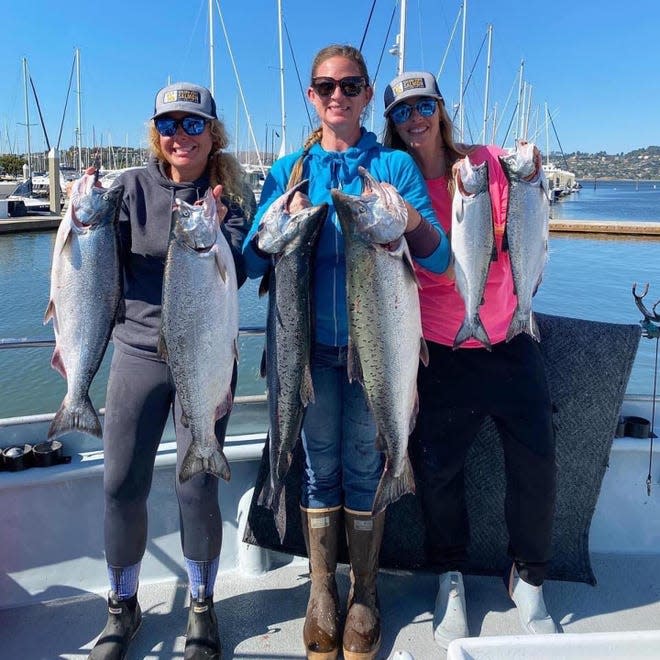Commercial, recreational ocean salmon fishing canceled. What does this mean for anglers?

Commercial and recreational fishing for Chinook salmon will be banned this year in marine waters off California, and most of Oregon due to historically low fall-run Chinook salmon returns to the Sacramento and Klamath watersheds last year.
On April 6, the Pacific Fishery Management Council (PFMC) unanimously recommended fully closing the recreational and commercial fishing season based on the low ocean salmon abundance estimates and low river returns.
“The forecasts for Chinook returning to California rivers this year are near record lows,” said Council Chair Marc Gorelnik. “The poor conditions in the freshwater environment that contributed to these low forecasted returns are unfortunately not something that the Council can, or has authority to, control.”
It is expected that the National Marine Fisheries Service will follow with regulatory action to enact the closure, effective in mid-May, according to the California Department of Fish and Wildlife (CDFW). The federal government in March already closed the recreational and commercial salmon fishing openers slated from early April to May 15.
In a teleconference on May 17, the California Fish and Game Commission is expected to follow suit in adopting a closure of inland recreational salmon fisheries on the Sacramento, Feather, American, and Mokelumne Rivers.
While Governor Gavin Newsom and state officials blame the drought and other factors for the low numbers of salmon, commercial and recreational anglers and Tribal fishermen point to state and federal water policies that favor providing water to agribusiness over maintaining healthy salmon populations and ecosystems.
“This is a direct reflection on California’s water policy and a devastating blow for the thousands of families that rely on salmon to pay their rent and mortgages and keep their life-sustaining businesses afloat,” said Scott Artis, executive director of Golden State Salmon Association (GSSA), in a statement. “Families across the State are already struggling with inflation, so it is imperative that lawmakers immediately come to the aid of affected communities with disaster relief.”
But the CDFW claims in a press release that “prolonged and historic drought, severe wildfires and associated impacts to spawning and rearing habitat, harmful algal blooms, and ocean forage shifts have combined to result in some of the lowest stock abundance forecasts on record for Sacramento River Fall Chinook and Klamath River Fall Chinook.”
“This decision, while difficult, is intended to allow salmon to recover to provide future fishing opportunities. Salmon are an iconic species in California,” said California Department of Fish and Wildlife Director Charlton H. Bonham. “We treasure them for their intrinsic, cultural, recreational, and commercial values. The state is committed to ensuring the long-term survival of our salmon runs and supporting our struggling fishing communities.”
“We are looking into all possible options to bring relief as soon as possible to fishing businesses to address costs incurred to maintain their commercial licenses and lost revenue when the season is entirely closed,” he noted.
John McManus, senior policy director for the Golden State Salmon Association, emphasized the economic hardship the closure will bring up and down the coast.
“This is the time of year when we usually start bringing salmon to market or home to put on the family dinner table,” said McManus. “Instead, families up and down the coast are very worried about how they’re going to pay the bills this year in a disaster that could have and should have, been avoided.”
This closure is the second time salmon fishing has been closed in California - the first was in 2008-2009. The decision was made due to low numbers of adult and two-year-old jack salmon that have survived the hostile conditions they’ve encountered in Central Valley rivers in recent years, said McManus.
“Upstream dam operations control all of these rivers,” said McManus. “Dam operation decisions favoring agriculture over salmon survival have resulted in inferior natural salmon reproduction in recent years because lethal hot water left after dam releases for agriculture have killed incubating salmon eggs. In addition, strong releases of water in the spring needed to wash baby salmon safely out of the Central Valley to the ocean have been diverted or withheld.”
In February, the PFMC estimated that 169,800 Sacramento Basin fall-run Chinook salmon are now in the ocean, but this estimate could be overly optimistic. Last year federal fishery managers estimated that more than 180,000 fall-run salmon would return to spawn, but less than 62,000 returned to the Sacramento River and tributaries.
“Fishery managers typically allow fishing that will still achieve a minimum goal of 122,000 salmon to spawn in the Sacramento Basin, but they’ve increased that target number in recent years,” McManus added. Information: https://www.pcouncil.org.
After the PFMC recommended a full closure, Governor Gavin Newsom announced his administration's request for a Federal Fishery Disaster Declaration to support impacted communities.
Although anglers are glad that Newsom is requesting federal fishery disaster relief, they point out that he is continuing to move forward with the Delta Tunnels project, the voluntary water agreements, and the planning for Sites Reservoir. According to salmon advocates, these water projects will only drive imperiled salmon fisheries closer and closer to extinction.
Meanwhile, due to the salmon closure, you can expect increased fishing pressure this year upon rockfish and lingcod stocks, California halibut, striped bass, and other fish species.
This article originally appeared on The Record: Commercial, recreational ocean salmon fishing canceled